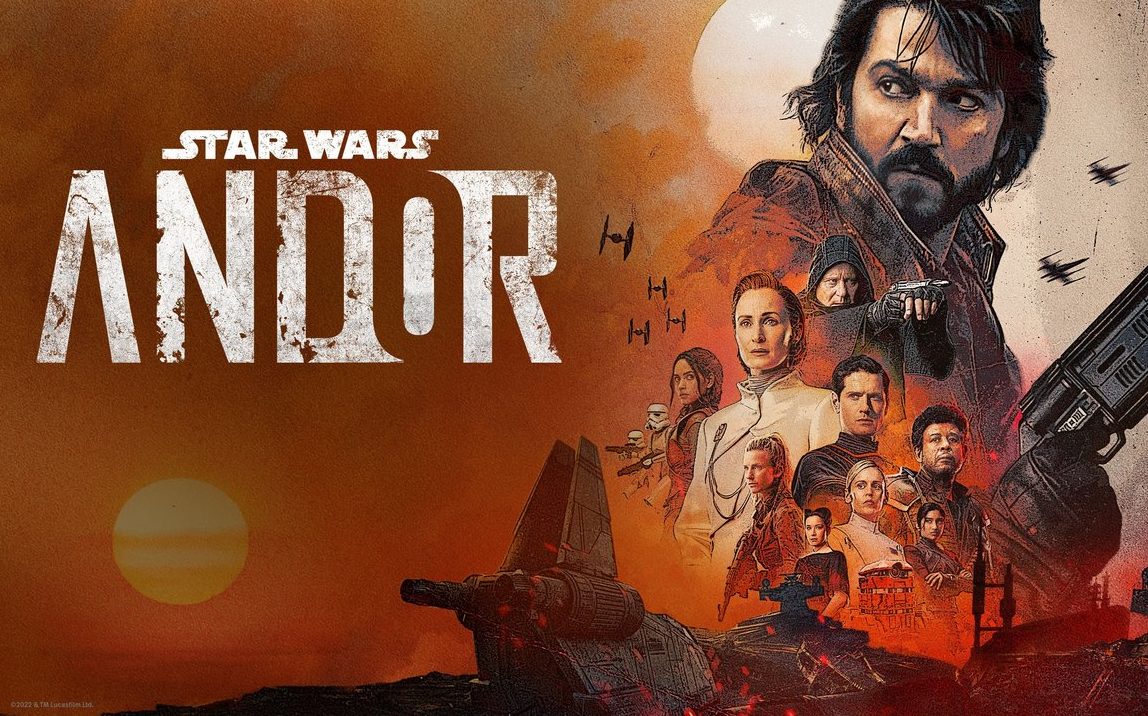Andor
 The entire two-season run of Andor, 24 episodes in all, is streaming on Disney+. Andor is prestige, must see television. It’s compelling human drama, acted brilliantly by some of the top actors working today. The writing and direction are inspired and intentional. The production design amazing. The fact that it is also one of the most compelling Star Wars sagas ever committed to screen is icing on the cake. But this draws from many real world documentaries and movies about conflicts, fascist takeovers and tactics, and rebellions; so while Andor may take place “a long time ago in a galaxy far, far, away,” it feels familiar, like it took place here too, in living memory.
The entire two-season run of Andor, 24 episodes in all, is streaming on Disney+. Andor is prestige, must see television. It’s compelling human drama, acted brilliantly by some of the top actors working today. The writing and direction are inspired and intentional. The production design amazing. The fact that it is also one of the most compelling Star Wars sagas ever committed to screen is icing on the cake. But this draws from many real world documentaries and movies about conflicts, fascist takeovers and tactics, and rebellions; so while Andor may take place “a long time ago in a galaxy far, far, away,” it feels familiar, like it took place here too, in living memory.
The first season, twelve of the most tense and compelling episodes of TV I’ve ever seen, traces Cassian Andor’s radicalization and his entry into the fight against tyranny five years before the events of Rogue One and Star Wars: A New Hope. The second season is also twelve episodes. Showrunner Tony Gilroy decided to cover the remaining four years of the Star Wars timeline with four three-episode arcs, with a one year jump per arc. At first I thought that might be jarring but it worked incredibly well.
The show does a great job of using production design, location, and the weariness of characters to clue you into events without ever needing to “info-dump.” You can see the rebellion has grown in size. You can see once-bustling locations empty and vice versa. And a sentence here or there is enough to fill in any gaps. Gilroy treats his audience like adults and trusts them to follow along, and it works. This is not a show you can multitask and watch, it grabs your attention and won’t let go.
I could go on about how absolutely amazing the world building, production design, and special effects are. But that’s almost expected of a Star Wars show. It’s the human drama that is the focus of this show. Scenes breathe and both protagonists and antagonists have complex mental and emotional lives. They aren’t just “characters,” they’re people. And the second season particularly keeps a clear focus on the show’s theme: the sacrifice that these characters make. Both sacrifices to build the rebellion, and sacrifices to an Empire that ultimately doesn’t care about anything but keeping the machine running. The answer of Luthian (Stellan Skarsgård), when confronted about what he’s personally sacrificed for the nascent rebellion, is a masterclass in both writing and acting.
All the acting is truly exceptional, lead by Stellan Skarsgård as Luthan Rael and Diego Luna as Cassian Andor. But everyone—Adrian Arjona (Bix), Elizabeth Dulau (Keyla), Denise Gough (Dedra), Kyle Soller (Syril), Genevieve O’Reilly (Mon Mothma), Benjamin Bratt (Bail Organa), and more—all fully inhabit and flesh out their characters. Of course the story has protagonists and antagonists, but the real villain is the Empire, which chews up and spits out protagonist and antagonist alike. You never root for the antagonists to succeed, but you do root for them to overcome their own flaws and brainwashing, to see the horrible machine that has devoured their lives for what it truly is.
It’s no surprise that the Empire and its propaganda and methods of controlling populations reflect what is happening geopolitically in our own world. Like all good science fiction, it’s set in a far-flung time and place but examines what’s happening here and now. Star Wars has always been political. George Lucas said from day one, Star Wars was always an anti-authoritarian fable; he intended the rebellion to represent the Viet Cong against the colonial powers. The names and situations may change but the people’s fight to live with self-determination, authenticity, and freedom, continues.
I’ll end with this: for a shared universe to survive and thrive, it needs to be able to sustain stories that have different tones and incorporate genres within it. The Marvel Cinematic Universe for example supports both traditional superhero action movies and also heist comedies. The Star Trek Universe supports the “serious” adventure sci-fi of Strange New Worlds and the absurdist comedy of Lower Decks. And so the Star Wars Universe has the family-friendly adventure science fantasy of the Skywalker Saga and The Mandalorian, the children-focused “Goonies in space” of Skeleton Key, and the adult-focused drama Andor. I would recommend it not just to Star Wars fans looking for adult fare, but really to anyone who wants to be immersed in a deep, moving war drama. And for those intrigued but not Star Wars fans, don’t worry, you don’t need to know Star Wars lore to get it, although knowing it makes it even richer.
People much more knowledgable and connected with regard to industry awards have been suggesting Andor will be nominated for All The Awards, and maybe it will. But either way, Andor is a prime example of the golden age of television.